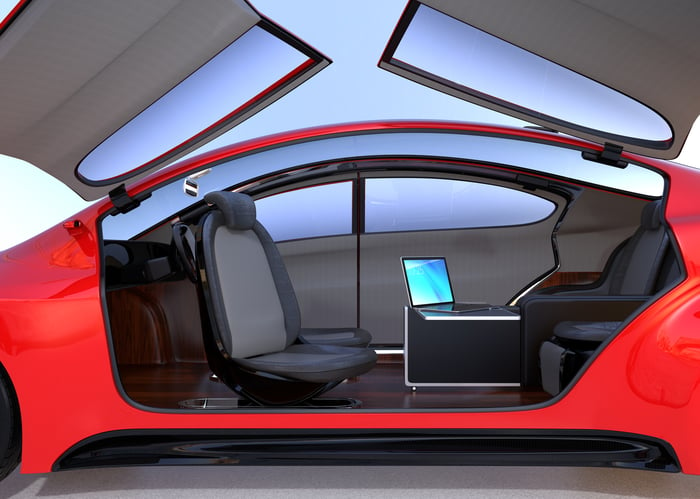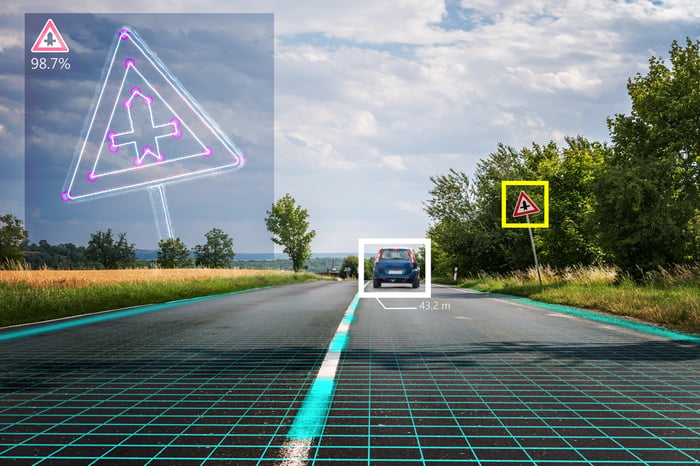Shares of graphics-chip maker NVIDIA (NVDA -3.87%) closed down 7.8% to $225.52 on Tuesday, after having been in the red as much as 9% during the session. For context, the S&P 500 and the tech-heavy Nasdaq fell 1.7% and 1.9%, respectively.
Here's what investors should know about the market darling's tough day.

Image source: Getty Images.
NVIDIA temporarily halted its self-driving vehicle testing
We can attribute NVIDIA stock's drop to two main reasons. First, technology stocks in general took a hit on Tuesday. The current sell-off that was largely ignited by Facebook's data scandal has spread throughout much of the sector, particularly impacting the popular big tech stocks. Shares of Google parent Alphabet and Amazon, for instance, declined 4.5% and 3.8%, respectively.
The second reason -- and likely the bigger one -- is that Reuters reported on Tuesday that NVIDIA temporarily suspended its driverless vehicle testing in light of the fatal accident in Arizona on March 18 involving an Uber self-driving vehicle striking and killing a woman as she was crossing the street. NVIDIA, which makes the DRIVE PX artificial intelligence (AI) platform for powering driverless vehicles, has been conducting testing of autonomous vehicles around the world, including in the Silicon Valley, New Jersey, Japan, and Germany.
Investors shouldn't conclude from NVIDIA's actions that anything is wrong with its technology. Its temporary halting of its self-driving vehicle testing is a responsible move. Here's what NVIDIA CEO Jensen Huang said about this topic during his keynote address on Tuesday that kicked off the company's annual GPU Technology Conference in San Jose:
We suspended testing not because we know that we're doing something wrong. We are already using all of the best techniques we know how to keep things safe. ... [W]e stopped for a second ... for a simple reason -- good engineering. Somebody has just learned something. There is an incident of great importance. We should stop and see what we can learn from them.
Uber is one of NVIDIA's newer driverless vehicle partners, though it isn't clear if the Uber vehicle, a Volvo XC90 SUV, was using any of NVIDIA's self-driving vehicle tech at the time of the accident. Bloomberg is reporting that Aptiv Plc supplied the radar and camera for the collision-avoidance system on the Uber vehicle and that Intel's Mobileye, which makes chips and sensors used in such systems, is a supplier to Aptiv. Moreover, Aptiv reportedly told Bloomberg that Uber disabled the standard collision-avoidance technology in the Volvo SUV involved in the accident and may have been testing its own driverless vehicle technology.
Even if Uber was using some of NVIDIA's self-driving vehicle tech in the car in question, based on the reporting surrounding the fatal incident -- including that the vehicle was supposedly exceeding the speed limit -- it seems extremely likely that the accident was entirely due to how Uber was using (or misusing) the technology.

Image source: Getty Images.
What's an investor to do?
There's no need for long-term investors to change course, in my opinion. Granted, NVIDIA shares might decline further if the tech stock sell-off continues, but riding out corrections is simply a part of investing for the long haul. Moreover, investors should keep things in perspective. Even after Tuesday's drop, NVIDIA stock has returned a whopping 110% for the one-year period through Tuesday, versus the S&P 500's return of 13.7%.
The trend toward autonomous vehicles is unstoppable. It doesn't seem likely that Uber's accident will push the timeline back -- at least, not significantly -- for the legalization of self-driving vehicles across the United States. Even in the off chance the timeline does get pushed back a bit, NVIDIA is still poised to handsomely profit when driverless vehicles start taking over the roads. More than 320 car and truck makers and others are developing with NVIDIA DRIVE PX. Moreover, the company has partnerships in this space with Toyota, Tesla, Mercedes-Benz, Volkswagen, Chinese tech giant Baidu, and Uber, among others.
Beyond driverless vehicles, NVIDIA is also in the early stages of profiting from other trends that promise to be huge, including esports, AI, virtual reality (VR), and drones.




